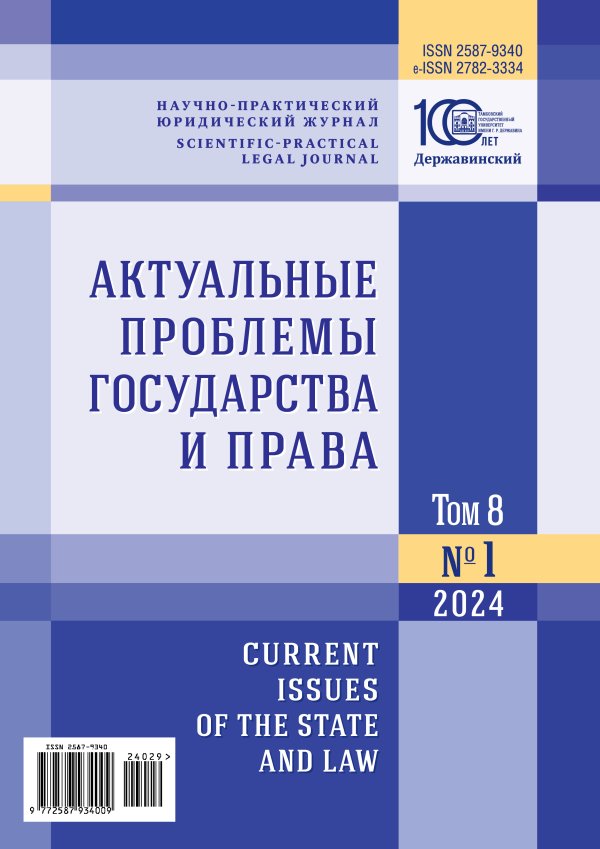General theoretical and cross-sectoral issues of anti-corruption: current state
- Authors: POPOVA N.A.1
-
Affiliations:
- Derzhavin Tambov State University
- Issue: Vol 8, No 1 (2024)
- Pages: 140-148
- Section: Национальная безопасность
- URL: https://bakhtiniada.ru/2587-9340/article/view/297382
- ID: 297382
Cite item
Full Text
Abstract
Corruption is one of the main threats to the national policy of the Russian Federation, impeding socio-economic development, the effective functioning of public authorities and the formation of civil society. Corruption control should be carried out as a result of a systematic approach aimed both at identifying offenses and eliminating the causes of their occurrence. The main provisions of national legislation aimed at combating the socio-legal phenomenon under consideration, as well as the norms enshrined in international legal acts, are studied. It is concluded that the Russian legislation aimed at countering corruption activities is an interdisciplinary institution, as a result of which it is based on the norms of various branches of law, in particular, criminal, administrative, civil and others. One of the features of countering corruption in the Russian Federation is the use of the most stringent repressive measures, which is expressed in legal formalization and standardization. The trends in tightening measures of criminal and administrative legal means, sanctions for violation of restrictions and prohibitions, as well as strengthening control over ongoing anti-corruption activities are highlighted. As a result of the comparative legal analysis, it is noted that the corruption control in the Russian Federation is carried out through mandatory norms enshrined in criminal and administrative legislation, which is due to the complex corruption situation in the state.
About the authors
Nadezhda A. POPOVA
Derzhavin Tambov State University
Author for correspondence.
Email: nad-popova-62@mail.ru
ORCID iD: 0000-0001-6502-7915
PhD (Law), Associate Professor of Criminal Law and Procedure Department of Law and National Security Institute
Russian Federation, 33 Internatsionalnaya St., Tambov, 392000, Russian FederationReferences
- DvoimennyI I.A. (2020). Basic aspects of anti-corruption policy in Russia at the present stage. Region: sistemy, ehkonomika, upravlenie = Region: Systems, Economy, Management, no. 2 (49), pp. 144-150. (In Russ.) https://doi.org/10.22394/1997-4469-2020-49-2-144-150, https://elibrary.ru/snhbje
- Kuznetsova O.A. (2023). The use of soft law in anti-corruption field. Aktual’nye problemy gosudarstva i prava = Current Issues of the State and Law, vol. 7, no. 4, pp. 504-514. (In Russ.) https://doi.org/10.20310/2587-9340-2023-7-4-504-514, https://elibrary.ru/crqleg
- Kholikov I.V., Kholikova A.I. (2023). Parliamentary investigation as a tool of counter corruption and power abuse. Aktual’nye problemy gosudarstva i prava = Current Issues of the State and Law, vol. 7, no. 4, pp. 551-557. (In Russ.) https://doi.org/10.20310/2587-9340-2023-7-4-551-557, https://elibrary.ru/ujlers
- Plotnikova T.V., Paramonov A.V. (2020). Specifics of some anti-corruption measures in Russia within the framework of public and state security. Aktual’nye problemy gosudarstva i prava = Current Issues of the State and Law, vol. 4, no. 16, pp. 541-147. (In Russ.) https://doi.org/10.20310/2587-9340-2020-4-16-541-547, https://elibrary.ru/xhnyce
- Orlov P.P. (2022). Prevention of corruption in the field of land and construction relations, criminological aspect. Aktual’nye problemy gosudarstva i prava = Current Issues of the State and Law, vol. 6, no. 4, pp. 584-590. (In Russ.) https://doi.org/10.20310/2587-9340-2022-6-4-584-590, https://elibrary.ru/ivvhqo
- Burtsev A.S., Semenyakin V.S. (2018). The development of modern Russian criminal anti-corruption legislation. Aktual’nye problemy gosudarstva i prava = Current Issues of the State and Law, vol. 2, no. 8, pp. 21-29. (In Russ.) https://doi.org/10.20310/2587-9340-2018-2-8-21-29, https://elibrary.ru/volrot
- Vorob’eva S.V. (2023). Economic security of the Russian Federation in the light of criminalization of economic relations. Aktual’nye problemy gosudarstva i prava = Current Issues of the State and Law, vol. 7, no. 2, pp. 249-262. (In Russ.) https://doi.org/10.20310/2587-9340-2023-7-2-249-262, https://elibrary.ru/rpuyfb
- Kozodaeva O.N., Mikhina E.G. (2022). Corruption crimes in healthcare: analysis and practice. Aktual’nye problemy gosudarstva i prava = Current Issues of the State and Law, vol. 6, no. 4, pp. 567-575. (In Russ.) https://doi.org/10.20310/2587-9340-2022-6-4-567-575, https://elibrary.ru/hphmpc
- Garmaev Yu.P., Ivanov E.A., Markuntsov S.A. (2020). On the development of an interdisciplinary concept of anti-corruption compliance in the Russian Federation. Pravo. Zhurnal Vysshei shkoly ekonomiki = Law. Journal of the Higher School of Economics, no. 4, pp. 106-128. (In Russ.) https://doi.org/10.17323/2072-8166.2020.4.106.12, https://elibrary.ru/sptifj
- Aleksandrova L.I. (2022). To the question of corruption in Russia. Sovremennaya nauka = Modern Science, no. 1, pp. 40-43. (In Russ.) https://elibrary.ru/gslmxa
- Konovalov V.A. (2013). Evolution of legal counteraction against corruption in Russia. Perspektivy nauki = Science Prospects, no. 5 (44), pp. 79-82. (In Russ.) https://elibrary.ru/rbhdid
- Alferov S.N. (2022). Administrative corruption offenses: the concept and features of responsibility for their commitment. Uchenye zapiski Krymskogo federal’nogo universiteta imeni V.I. Vernadskogo. Yuridicheskie nauki = Scientific Notes of V.I. Vernadsky Crimean Federal University. Juridical Science, no. 3, pp. 95-101. (In Russ.) https://elibrary.ru/comdpp
- Mar’ina E.V. (2010). Korruptsionnye prestupleniya: otraslevoe i mezhotraslevoe soglasovanie norm: avtoref. dis. ... kand. yurid. nauk [Corruption Crimes: Sectoral and Inter-Sectoral Harmonization of Norms. PhD (Law) diss. abstr.]. Samara, 24 p. (In Russ.) https://elibrary.ru/zojdfx
- Kulakova M.N. (2018). The concept and criteria of legal evaluation of corruption crime. Vestnik Nizhegorodskoi akademii MVD Rossii = Legal Science and Practice: Journal of Nizhny Novgorod Academy of the Ministry of Internal Affairs of Russia, no. 2 (42), pp. 176-181. (In Russ.) https://doi.org/10.24411/2078-5356-2018-10028, https://elibrary.ru/xtgvlv
- Verchenko N.I. (2014). To the question of definition of signs of corruption crimes. Vestnik NGUEU = Vestnik NSUEM, no. 2, pp. 364-370. (In Russ.) https://elibrary.ru/smfqrv
- Vorodyukhin S.E., Glushkov E.L. (2020). Civil legal liability for corruption offenses in Russian Federation. Problemy pravookhranitel’noi deyatel’nosti = Problems of Law-Enforcement Activity, no. 4, pp. 6-9. (In Russ.) https://elibrary.ru/vnlqjj
Supplementary files








